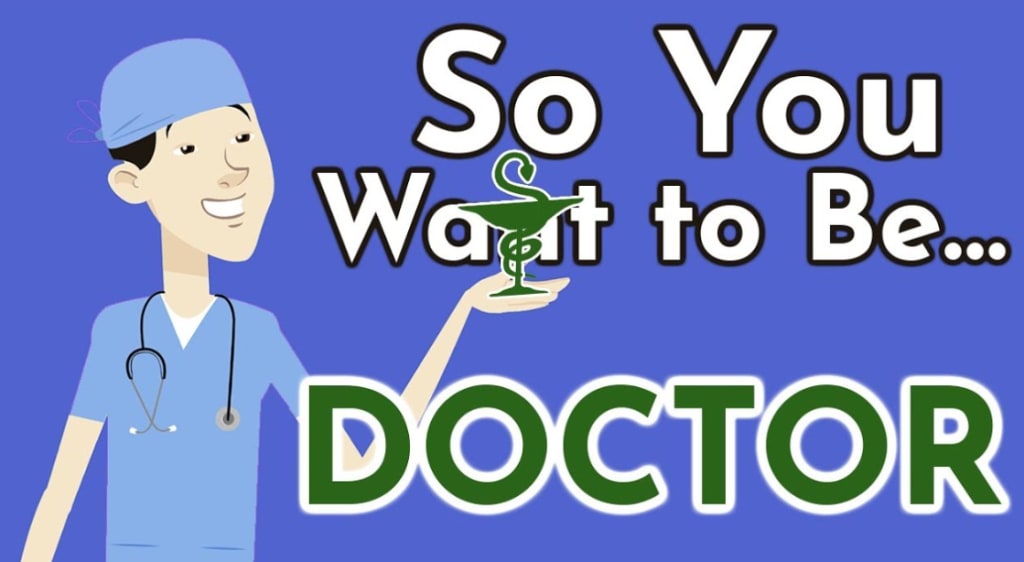10 steps to become a home doctor
How to become a doctor by self-study at home

### 10 Steps to Become Your Own Home Doctor: A Practical Guide
With the rising costs of healthcare and the desire for more personal control over our well-being, becoming your own home doctor is an appealing idea. While it’s crucial to know when to seek professional medical advice, many everyday health issues can be managed effectively at home with the right knowledge and tools. Here's a comprehensive guide to help you take charge of your health safely and confidently.
---
#### 1. **Educate Yourself on Basic Health Knowledge**
Understanding the basics of human anatomy, common illnesses, and first aid is the cornerstone of becoming a competent home doctor. There are numerous online courses, books, and community classes designed to teach you these fundamentals. Start with:
- **First Aid and CPR Certification**: Courses offered by the Red Cross or local community centers are invaluable.
- **Basic Anatomy and Physiology**: Resources like Khan Academy or the "For Dummies" series provide accessible overviews.
- **Reliable Health Websites**: Websites such as Mayo Clinic or WebMD can be excellent references for symptoms and treatments.
---
#### 2. **Build a Comprehensive Home Health Kit**
A well-stocked home health kit goes beyond just band-aids and antiseptics. Consider including:
- **Digital Thermometer**
- **Blood Pressure Monitor**
- **Pulse Oximeter**
- **Basic OTC Medications** (e.g., pain relievers, antihistamines, anti-diarrheals)
- **First Aid Supplies** (e.g., bandages, gauze, antiseptics)
- **Specialized Tools** (e.g., a splint kit, burn gel)
Regularly check and replenish your supplies to ensure they are not expired and ready to use when needed.
---
#### 3. **Learn How to Monitor Vital Signs**
Vital signs like temperature, blood pressure, and heart rate are key indicators of health. Knowing how to measure these at home can help you catch potential issues early. Here’s how you can start:
- **Temperature**: Use a digital thermometer to take oral or underarm readings.
- **Blood Pressure**: Learn to use an automatic blood pressure cuff for accurate readings.
- **Pulse**: Understand how to check your pulse manually or with a pulse oximeter.
---
#### 4. **Understand and Manage Common Ailments**
Many everyday health issues, like colds, minor cuts, and muscle strains, can be effectively managed at home. Equip yourself with knowledge on:
- **Symptom Recognition**: Know the difference between symptoms that can be managed at home and those requiring medical attention.
- **Home Remedies and OTC Medications**: Use safe and proven home remedies or over-the-counter treatments.
- **Preventive Measures**: Implement lifestyle changes and hygiene practices to avoid common illnesses.
---
#### 5. **Develop Healthy Lifestyle Habits**
Prevention is often the best medicine. Adopting a healthy lifestyle can reduce your risk of many diseases and improve your overall well-being. Focus on:
- **Balanced Diet**: Eat a variety of foods rich in nutrients.
- **Regular Exercise**: Aim for at least 30 minutes of moderate activity most days of the week.
- **Adequate Sleep**: Ensure you get 7-9 hours of quality sleep each night.
- **Stress Management**: Practice relaxation techniques like meditation or deep breathing exercises.
---
#### 6. **Stay Up-to-Date with Vaccinations and Screenings**
Even as your own home doctor, professional healthcare still plays a role in preventive care. Ensure you:
- **Follow Immunization Schedules**: Stay current with vaccinations as recommended by health authorities.
- **Regular Screenings**: Keep up with routine screenings for blood pressure, cholesterol, and cancer as advised by your doctor.
---
#### 7. **Learn to Use Technology for Health Management**
In the digital age, technology can significantly aid in managing your health. Consider integrating:
- **Health Apps**: Use apps to track your health metrics, medication schedules, and exercise routines.
- **Telemedicine Services**: Access remote consultations for non-emergency health concerns.
- **Online Medical Libraries**: Utilize resources like PubMed for researching medical conditions and treatments.
---
#### 8. **Understand When to Seek Professional Help**
Even with extensive knowledge and preparation, knowing your limits is critical. Seek professional medical advice for:
- **Severe or Persistent Symptoms**: Symptoms like high fever, chest pain, or prolonged discomfort should not be ignored.
- **Injuries Beyond First Aid**: Fractures, deep wounds, or severe burns require medical intervention.
- **Chronic Conditions**: Conditions like diabetes, heart disease, or asthma need ongoing professional management.
---
#### 9. **Create a Family Health Plan**
Being a home doctor often involves managing the health of your loved ones as well. Develop a plan that includes:
- **Emergency Contacts and Information**: Have a list of emergency numbers and health records easily accessible.
- **Health Histories**: Keep a detailed health history for each family member, including allergies, medications, and past medical issues.
- **Emergency Procedures**: Educate your family on basic first aid and emergency protocols.
---
#### 10. **Keep Learning and Updating Your Skills**
Medicine is a constantly evolving field, and staying informed is crucial. Commit to:
- **Continuous Education**: Take advanced courses, attend workshops, and read medical journals to keep your knowledge current.
- **Join Health Communities**: Engage with online forums, support groups, or local clubs focused on health and wellness.
- **Reflect and Adapt**: Regularly evaluate your home health practices and adjust them based on new information or experiences.
---
### Conclusion
Becoming your own home doctor is an empowering journey that enhances your ability to manage health issues and improve your overall well-being. By following these steps, you’ll be well-equipped to handle everyday medical situations and make informed decisions about when to seek professional care. Remember, while being a home doctor can cover many bases, it’s always essential to recognize the value and expertise of healthcare professionals in your wellness journey.
## How to Become a Doctor by Self-Study at Home: Navigating the Journey to Medical Expertise
Becoming a doctor typically involves years of rigorous education and training within formal institutions. However, the advent of online learning and open-access resources has made self-study a powerful tool for those aspiring to gain medical knowledge. While you cannot legally practice as a licensed doctor without formal qualifications, self-studying can prepare you for medical school, deepen your understanding of healthcare, or satisfy a personal passion for medicine. Here’s how to embark on a self-guided journey to medical expertise from home.
---
### 1. **Start with a Solid Foundation in Basic Sciences**
The journey to medical knowledge begins with a strong grasp of basic sciences such as biology, chemistry, and physics. These subjects are the building blocks of medical understanding.
- **Online Courses**: Platforms like Khan Academy, Coursera, and edX offer free or affordable courses in these foundational subjects.
- **Textbooks and Resources**: Standard pre-medical textbooks like “Campbell Biology,” “Chemistry: The Central Science,” and “Physics for Scientists and Engineers” can be invaluable.
- **Practical Experiments**: Conduct simple experiments at home or use virtual labs to reinforce theoretical concepts.
---
### 2. **Delve into Human Anatomy and Physiology**
A detailed understanding of the human body’s structure and functions is crucial for any aspiring medical professional.
- **Anatomy and Physiology Courses**: Websites like Khan Academy and online medical schools offer comprehensive courses on these topics.
- **3D Anatomy Tools**: Apps like Complete Anatomy or Visible Body allow you to explore detailed 3D models of the human body.
- **Dissection Videos**: While hands-on dissection is ideal, videos of cadaver dissections can provide an in-depth look at human anatomy.
---
### 3. **Master Medical Terminology**
Medical terminology is the language of medicine, essential for understanding and communicating medical information effectively.
- **Medical Terminology Courses**: Many online platforms offer specific courses on medical terminology.
- **Flashcards and Apps**: Tools like Quizlet and apps like Medical Terminology Flashcards can help reinforce your learning.
- **Practice Reading Medical Literature**: Try reading medical journals or case studies to familiarize yourself with the terminology in context.
---
### 4. **Explore Pathophysiology and Pharmacology**
Understanding diseases (pathophysiology) and their treatments (pharmacology) is a core aspect of medical education.
- **Online Pathophysiology and Pharmacology Courses**: Look for courses on platforms like Coursera or Medscape.
- **Case Studies**: Reading case studies helps contextualize how diseases affect the body and the rationale behind treatments.
- **Drug Databases**: Familiarize yourself with resources like the Drug Information Portal by the National Institutes of Health.
---
### 5. **Study Clinical Skills and Diagnostic Methods**
Although practicing clinical skills at home is limited, you can still learn about diagnostic processes and the principles behind them.
- **Clinical Skills Videos**: YouTube and medical education websites often feature videos demonstrating clinical skills and diagnostic techniques.
- **Diagnostic Guides**: Textbooks like “Bates’ Guide to Physical Examination and History Taking” provide detailed insights into patient assessment.
- **Virtual Simulations**: Some platforms offer virtual patient simulations to practice diagnostic reasoning.
---
### 6. **Learn About Medical Ethics and Communication**
Understanding the ethical framework and developing strong communication skills are crucial for any aspiring doctor.
- **Courses in Medical Ethics**: Many universities offer free courses on medical ethics, such as those available on FutureLearn or Coursera.
- **Books on Doctor-Patient Communication**: Reading books like “The Patient Will See You Now” by Eric Topol or “How Doctors Think” by Jerome Groopman can offer valuable insights.
- **Role-Playing**: Practice communicating medical information with friends or family to build your skills.
---
### 7. **Stay Updated with Medical Research and Advances**
Medicine is a constantly evolving field, and keeping up with the latest research and advancements is essential.
- **Medical Journals and Publications**: Regularly read journals like JAMA, The Lancet, or New England Journal of Medicine.
- **Podcasts and Webinars**: Subscribe to medical podcasts or webinars for ongoing education and insights from experts.
- **Follow Medical Blogs and Social Media**: Engage with content from reputable medical professionals and institutions on platforms like Twitter and LinkedIn.
---
### 8. **Participate in Online Medical Communities and Forums**
Connecting with others who share your passion for medicine can provide support and enhance your learning.
- **Online Forums and Discussion Groups**: Join platforms like Student Doctor Network or Reddit’s r/medicine.
- **Virtual Study Groups**: Form or join virtual study groups to discuss topics and share resources.
- **Networking with Professionals**: Reach out to medical professionals or mentors for advice and guidance.
---
### 9. **Engage in Practical Experience Where Possible**
While hands-on clinical experience is limited at home, you can still gain practical insights.
- **Volunteer Opportunities**: Volunteer at local clinics, hospitals, or community health events to observe and learn.
- **Shadowing Doctors**: If possible, arrange to shadow doctors to gain firsthand experience of clinical practice.
- **Online Internships or Projects**: Look for virtual internships or research projects related to healthcare.
---
### 10. **Prepare for Formal Medical Education**
If your goal is to eventually attend medical school, self-study can be an excellent preparatory step.
- **MCAT Preparation**: Use self-study resources and practice exams to prepare for the Medical College Admission Test (MCAT).
- **Pre-Med Courses**: Enroll in required pre-med courses online or at community colleges.Home Doctor Review
- **Application Process**: Research medical school application requirements and start preparing your personal statement and recommendations.
---
### Conclusion
While self-study at home cannot replace the formal education and clinical training required to become a licensed doctor, it offers a valuable pathway to deepen your understanding of medicine, prepare for medical school, or fulfill a personal interest. By following these steps, you can embark on a journey of medical self-education, equipping yourself with the knowledge and skills to contribute meaningfully to healthcare or prepare for a future in medicine.
About the Creator
peter
Content about cars, motorbikes, technology, news
Enjoyed the story? Support the Creator.
Subscribe for free to receive all their stories in your feed. You could also pledge your support or give them a one-off tip, letting them know you appreciate their work.






Comments
There are no comments for this story
Be the first to respond and start the conversation.